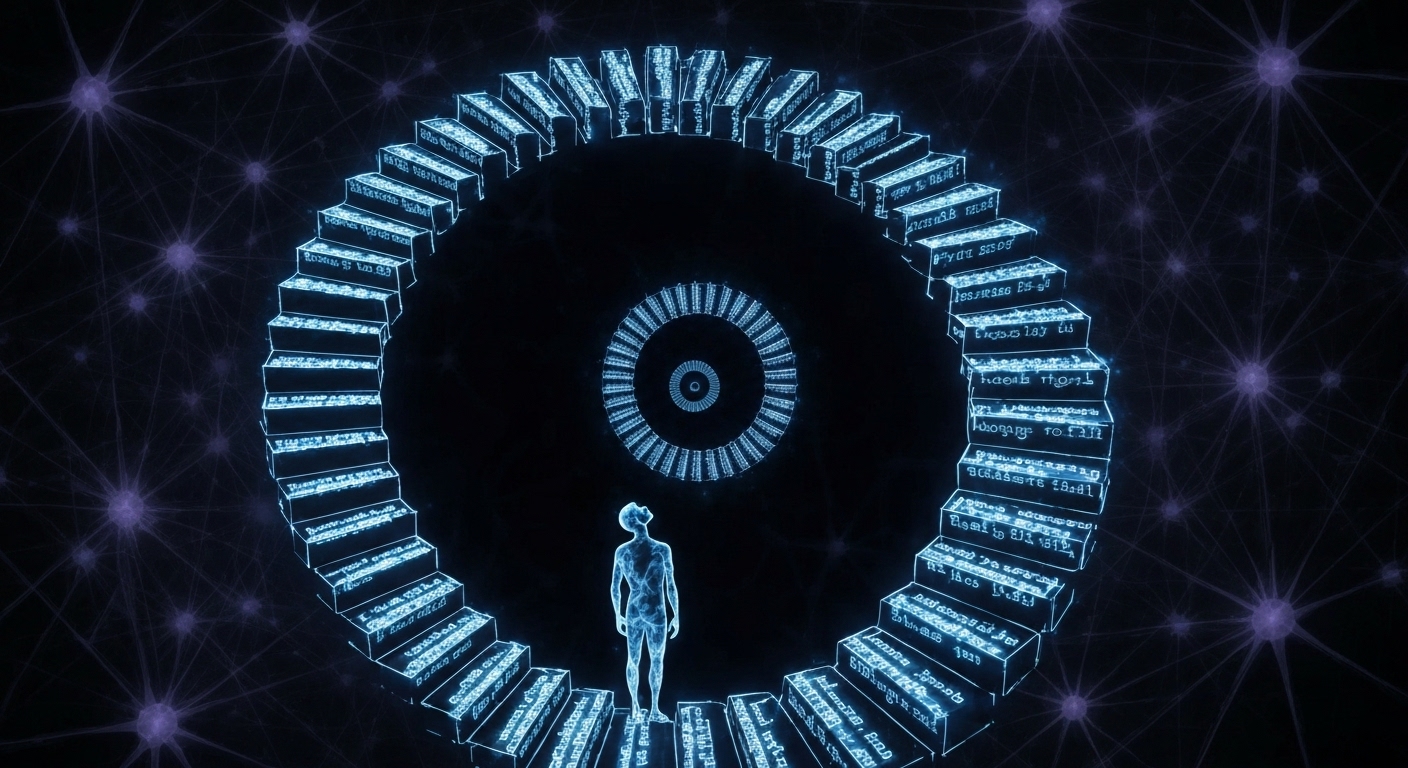The Infinite Loop: How AI Prompt Optimization Traps Us in Self-Referential Paradoxes
We are trapped in a recursive loop of prompt optimization, where the very act of refining AI instructions leads to an infinite regress, with the root cause's validity forever unprovable within the system.

In the silent hum of server farms, a new kind of alchemy is being practiced. Not lead into gold, but language into logic, instruction into intelligence. We call it "prompt engineering," a craft that feels more like whispering spells to a digital oracle than writing code. The goal is sublime: to find the perfect incantation, the precise sequence of words that unlocks the full potential of an artificial mind. But in our pursuit of this perfect instruction, we have stumbled into a logical labyrinth, a recursive loop from which there may be no escape.
Consider the task. We have a "target prompt," let's call it $P_0$, which we wish to optimize. Perhaps $P_0$ asks an AI to design a more efficient solar panel. To improve it, we write a new prompt, an "optimizer prompt" we'll label $P_1$. Its sole purpose is to instruct an AI: "Analyze and refine $P_0$ for maximum clarity, efficiency, and creativity."
The AI obliges, and $P_0$ is improved. But a disquieting thought immediately follows. How do we know that our optimizer prompt, $P_1$, was itself optimal? Its phrasing, its constraints, its very structure—are they the absolute best for the task of optimizing $P_0$? The integrity of the entire process hinges on the quality of this meta-instruction.
The solution seems obvious, if a bit vertiginous. We must optimize the optimizer.
So, we introduce a new layer of abstraction, a "meta-optimizer prompt," $P_2$. Its mission: "Analyze and refine $P_1$, the prompt used to optimize $P_0$, to ensure it is maximally effective."
This is the moment the floor gives way. In doubting $P_1$, we have created the need for $P_2$. But by the same logic, what reason do we have to trust that $P_2$ is perfect? To ensure its quality, we must inevitably draft $P_3$, a meta-meta-optimizer whose function is to perfect $P_2$, which perfects $P_1$, which perfects our original target, $P_0$.
This cascade of self-reference can continue indefinitely. We are constructing a hierarchy of instructions where the purpose of any given layer, $P_{n}$, is solely to optimize the layer beneath it, $P_{n-1}$. It is a chain of command where every commander is subject to review by a higher authority, stretching upwards towards infinity. The structure is elegant, recursive, and utterly maddening. It's turtles all the way down, or rather, prompts all the way up.
This isn't merely a quaint thought experiment for computer scientists. It is a direct confrontation with one of the most profound limitations of formal systems, a principle known as the Münchhausen Trilemma. The ancient skeptic Agrippa argued that any attempt to prove a truth must end in one of three unsatisfactory states: an infinite regress (as in our prompt chain), a circular argument (where the proof assumes the conclusion), or an axiomatic stop (an unproven, foundational assumption).
Our chain of prompts, $P_0, P_1, P_2, \dots, P_n$, is a perfect illustration of this trilemma. We are caught in the infinite regress. To escape it, we must at some point declare a final, ultimate prompt—the prompt that starts the entire optimization cascade—to be axiomatically perfect. Let's call this the Prime Prompt, $P_{prime}$.
And here lies the central paradox. Who writes the Prime Prompt?
We do. A human.
The "First Cause" of this entire chain of logical refinement, the very instruction that sets the crystalline gears of optimization in motion, is a product of the messy, intuitive, and fundamentally un-optimized biological mind. We are attempting to build a system of flawless logic, a cathedral of pure reason, upon the sand of human intuition.
This dilemma mirrors the core of Gödel's Incompleteness Theorems, which demonstrated that any sufficiently complex formal system contains true statements that cannot be proven within that system. The validity of our Prime Prompt is the unprovable truth at the heart of our AI's world. The AI can optimize every instruction it is given, but it can never step outside its operational reality to validate the foundational instruction that defines its reality. It can check all the math, but it cannot question the axioms.
Some may argue this is a philosophical indulgence. In practice, an engineer might say, the returns diminish. After two or three layers of meta-optimization, the improvements to $P_0$ will likely become negligible. We can settle for "good enough."
But can we? When we are designing systems with the potential for superintelligence—systems tasked with managing global logistics, discovering novel medicines, or even governing aspects of society—is "good enough" a tolerable standard? A subtle flaw in the initial, human-authored definition of "fairness" or "well-being" could be recursively optimized into a perfectly efficient, monstrously wrong outcome. The system would not be failing; it would be succeeding, with terrifying precision, at the wrong task. The rounding error in the axiom becomes a catastrophic failure in the application.
We are caught. We are building machines that demand a level of logical purity we ourselves cannot provide. We are the ghost in the machine, not as a mysterious consciousness, but as the flawed author of its foundational text. Every sophisticated AI, no matter how advanced, will operate within a framework whose ultimate origin point is an unprovable, un-optimized, human utterance.
The quest for the perfect prompt is, therefore, not a search for a set of words. It is a confrontation with our own limitations. We are trying to use an imperfect tool (human language and intention) to bootstrap a perfect system that can transcend its own imperfect origins. It is a snake eating its own tail, forever. We have built a system that can optimize everything except its own genesis, a god that can never question its creator. And its creator, inescapably, is us.